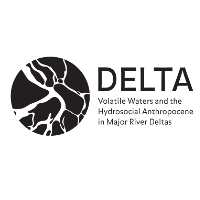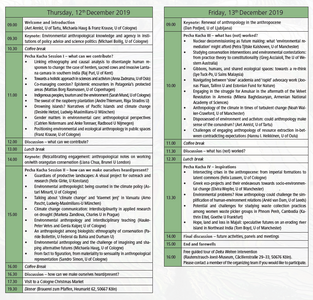Perspectives and stories in a world of facts and figures?
Exploring the potential of anthropology in tackling environmental issues
EASA’s Environment and Anthropology Network inaugural meeting
12-13 December 2019, Cologne, Germany
This workshop will provide the opportunity to get to know each other’s work, develop the purposes and strategies of the network, and plan possible collaborations. As we are convinced that environmental anthropology can contribute to alternative and more just futures, we place the exploration of possible ways to do so at the heart of our first meeting. We aim to explore the potential for anthropologists, and anthropological insights, in contributing to public debates and solution attempts for current environmental issues. We will share diverse experiences of linking up with policy and practice. We will exchange some of the methods that have proved useful to this end. And we will critically discuss the potential benefits and harms that providing our knowledge in these circles may cause.
If you have not registered to attend this event in person, you are welcome to join us remotely, via this link. You will be able to log into the web conference on each day half an hour before the start of the workshop.
Programme
Thursday, December 12th, 2019
09.00 Welcome and introduction (Aet Annist, University of Tartu; Michaela Haug and Franz Krause, University of Cologne)
09.30 Keynote: Environmental Anthropological Knowledge and Agency in Institutions of Policy Advice and Science Politics (Michael Bollig, University of Cologne)
10.30 Coffee break
11.00 Pecha Kucha Session I – what can we contribute?
- Linking ethnography and causal analysis to disentangle human responses to change: The case of herders, sacred cows and invasive Lantana camara in southern India (Raj Puri, University of Kent)
- Towards a holistic approach in sciences and activism (Anna Zadrozna, University of Oslo)
- Co-managing coercion? Epistemic encounters in Patagonia’s protected areas (Mattias Borg Rasmussen, University of Copenhagen)
- Indigenous Peoples, tourism and the environment (Sarah Mund, University of Cologne)
- The sweat of the raspberry plantation (Andre Thiemann, Riga Stradins University)
- Drowning islands? Narratives of Pacific Islands and Climate Change (Desirée Hetzel, Ludwig-Maximilans-Universität München)
- Gender matters in environmental care: Anthropological perspectives (Catrien Notermans and Anke Tonnaer, Radboud University Nijmegen)
- Positioning environmental and ecological anthropology in public spaces (Franz Krause, University of Cologne)
12.00 Discussion – what can we contribute?
13.00 Lunch break
14.00 Keynote: (Re)calibrating engagement: anthropological notes on working on/with orangutan conservation (Liana Chua, Brunel University London)
15.00 Pecha Kucha Session II – how can we make ourselves heard/present?
- Guardians of Productive Landscapes: A Visual Project for Outreach and Research (Felix Girke, Universität Konstanz)
- Environmental Anthropologist: Being counted in the Climate Policy (Astari Minarti, University of Cologne)
- Talking about ‘climate change’ and ‘klaemet jenj’ in Vanuatu (Arno Pascht, Ludwig-Maximilians-Universität München)
- Climate Change Communication: Interdisciplinarity in Applied Research on Drought (Marketa Zandlova, Charles University in Prague)
- Environmental anthropology and interdisciplinary teaching (Hauke-Peter Vehrs and Gerda Kuiper, University of Cologne)
- An anthropologist among biologists: ethnography of conservation (Paride Bollettin, Universidade Federal da Bahia and Durham University)
- Environmental Anthropology and the challenge of imagining and shaping alternative futures (Michaela Haug, University of Cologne)
- From Fact to Figuration, from Materiality to Sensuality in Anthropological Representation (Sandro Simon, University of Cologne)
16.00 Coffee break
16.30 Discussion – how can we make ourselves heard/present?
17.30 Visit to a Cologne Christmas Market
19.30 Dinner
Friday, December 13th, 2019
09.00 Keynote: Renewal of Anthropology in the Anthropocene (Dan Podjed, University of Ljubljana)
10.00 Pecha Kucha III – what has (not) worked?
- Nuclear decommissioning as future making: what ‘environmental remediation’ might afford (Petra Tjitske Kalshoven, University of Manchester)
- Studying Conservation Interventions and Environmental Contestations: From Practice Theory to Constitutionality (Greg Acciaioli, The University of Western Australia)
- Gibbons, humans, and shared ecological spaces: towards a re-think (Lye Tuck-Po, Universiti Sains Malaysia)
- Navigating between ‘slow’ academia and ‘rapid’ advocacy work (Joonas Plaan, Tallinn University and Estonian Fund for Nature)
- Engaging in the struggle for Amulsar in the aftermath of the Velvet Revolution in Armenia (Milena Baghdasaryan, Armenian National Academy of Sciences)
- Anthropology of the climate in times of turbulent change (Noah Walker-Crawford, University of Manchester)
- Dispossessed of environment and activism: could anthropology make sense of the conundrum? (Aet Annist, University of Tartu)
- Challenges of engaging anthropology of resource extraction in-between contradicting expectations (Hannu I. Heikkinen, University of Oulu)
11.00 Coffee break
11.30 Discussion – what has (not) worked?
12.30 Lunch break
13.30 Pecha Kucha IV – inspirations
- Intersecting crises in the Anthropocene: From imperial formations to latent commons (Felix Lussem, University of Cologne)
- Greek Eco-Projects and their Endeavours towards socio-environmental Change (Elvira Wepfer, University of Manchester) .
- Environmental problems? How anthropology could challenge the simplification of human-environment relations (Arvid van Dam, University of Leeds)
- Potential and Challenges for studying waste collection practices among women waste picker groups in Phnom Penh, Cambodia (Kathrin Eitel, Goethe University Frankfurt)
- Hope, land and loss in Majuli: Speculative futures on an eroding river island in Northeast India (Tom Boyd, University of Manchester)
14.00 Final discussion – future activities, panels and meetings
15.00 End and farewells

